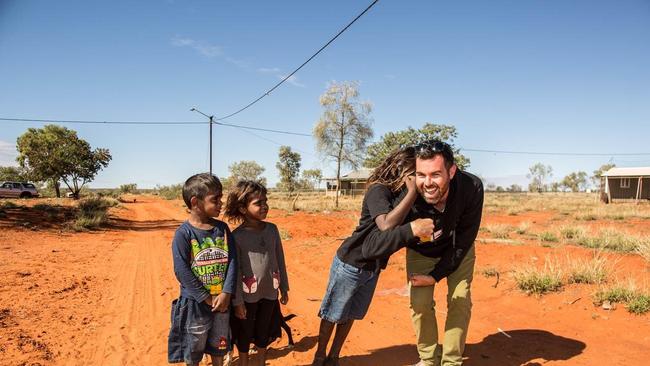IT’S been labelled as both “modern day slavery” and a “resounding success” in recent days. Now, new changes to the Community Development Program (CDP) has employment service providers worried.
Chief among their concerns is that jobseekers within the remote work-for-the-dole scheme could be pushed further below the poverty line by new punitive measures — and it is the NT that would bear the brunt of it.
Despite having just under 1 per cent of the country’s population, data has shown the Territory has received 52 per cent of all CDP penalties.
Of the national total of 215,485 in 2017, 112,511 infringements came from the NT.
There are approximately 35,000 CDP participants nationally and 83 per cent of participants are indigenous.
In the remote community of Maningrida there were more than four times as many penalties recorded in 2017 than there were people living in the area, with 9309 infringements issued for an estimated population of just over 2000.
During the nearly three years of CDP operations in the community, from June 2015 until May 2018, only 80 people made 26 week employment claims.
According to ANU Centre for Aboriginal Economic Policy Research, the CDP program has seen a 740 per cent increase in financial penalties since its introduction in 2015 compared with the preceding Remote Jobs and Communities Program. 90 per cent of all penalties have been applied to indigenous people.
It is these figures that are causing the CDP, also known as the remote work-for-the-dole program, to cop heated criticism. Both Federal Labor politicians and Territory Labor MLAs have spoken out against the scheme, which is administrated and championed by CLP Indigenous Affairs Minister Nigel Scullion.
Scullion introduced the Social Security Legislation Amendment (Community Development Program) Bill 2018 on August 28, which will amend the Social Security Act 1991 and the Social Security (Administration) Act 1999.
Key elements of the reforms include support for 6000 subsidised jobs across remote Australia, changes to job seeker assessments and reducing the maximum hours of required work from 25 to 20 hours.
Current CDP participants must undertake up to three times as much work or training each week than non-remote jobseekers. The Bill also seeks to apply a Targeted Compliance Framework (TCF).
NT Labor Senator Malarndirri McCarthy, who was a part of the Senate committee charged with reviewing the program’s proposed changes, said it was the TCF that concerned her the most.
“I am concerned around the breaching. The amendments that the government wants to bring in are around TCF, which is really going to be about making sure that there are further penalties on people. I just find that a real issue,” she said.
“Those penalties have resulted in quite severe breaching of participants and that is what disturbs me more than anything. People in our communities who don’t have any money whatsoever and who can go for four to eight weeks without anything, can’t feed themselves, can’t feed their children, can’t pay the rent or any debts they might have. We’re looking at entrenched poverty”
McCarthy said she had heard from several participants first-hand about how these breaches can occur, which can see welfare payments cut off for up to eight weeks.
“We heard from so many witnesses expressing that breaches can come from things as simple as an inability to cross a flooded river to get to a location where their provider is,” she said.
“Sometimes it is for very practical reasons, like the inability to communicate. So if you are in an area where you don’t have mobile phone coverage and you certainly don’t have any other phone access, you can’t just go on to the Centrelink app or website and tell them that you’re having difficulties.
“I think these are some very practical and real issues for people in the Northern Territory.”

McCarthy said she supported the views portrayed in a speech made earlier this week by Namatjira MLA Chansey Paech, who labelled it “criminal” and likened the CDP to “modern day slavery”.
“It certainly can be viewed as slavery for people who are working in jobs and are getting only just over $11 an hour. This is not good enough. In fact, I would go further and say it is exploitation,” McCarthy said.
“The CDP is a disgrace. The government has been told the concerns not only from two senate inquiries but also by the Australian National Audit Office, which delivered its report this time last year and raised some serious concerns.”
In his speech on Tuesday evening, Paech said many of his constituents in Central Australia had been driven out of their communities and into town in order to survive following CDP breaches.
“It’s not hard to understand or relate that when someone on CDP is breached and they are down to their last $60 they have to make a choice,” he said.
“Do they stay in community and spend their last few dollars at an overpriced store or do they invest that money into to fuelling up the car and head into town where they know they’ll have some support from family, friends or not-for-profit organisations?
“I was told by a few business people that on the occasions that they were broken into the perpetrator did not take the expensive equipment, merchandise or cash but rather any form of food they could find. Why? Because they’ve been push into town by the Federal Government’s own version of the Hunger Games.”

But Scullion was not backing down on his proposed legislation changes when questioned this week and has fiercely opposed any accusations of exploitation.
He told the NT News the program had clearly been a “resounding success”.
“All Australian jobseekers no matter where they live are required to fulfil activity requirements. This is a fundamental aspect of our welfare system and I know that Territorians will join me to reject any moves to water this down,” he said.
“The CDP has clearly been a resounding success and has seen remote jobseeker engagement increase from 6 per cent under the failed policies of Labor up to over 70 per cent under the Coalition.”
Scullion said there was no evidence the CDP was causing hardship or forcing people to go without food.
“In one of the most appalling examples of political bastardry the Senate has ever witnessed, Labor and the Greens have already announced their opposition to these important reforms and are happy to play politics with the lives of remote job seekers,” he said.
“The effect of their actions is to see no improvement to the CDP program in the near future and to subject remote jobseekers to a program they continually criticise.”

He argued the TCF would only apply to deliberately non-compliant job seekers and would “result in a significant reduction in the number of penalties” but penalties would be carried out in full regardless of whether the participant re-engages.
“When a penalty is applied, a job seeker is required to serve the full term before receiving income support payments again, however CDP providers are required to work closely and regularly with job seekers and ensure a job seeker’s capacity assessments are up to date,” he said.
Beyond the political war of words currently surrounding the CDP, submissions by service providers to the Senate Community Affairs Legislation Committee show what those working on the ground are really thinking.
Their suggestions to improve the current set up of the initiative range in scope and methodology but employment services engaged within the CDP have collectively rejected the changes and current status quo.
The National Aboriginal Community Controlled Health Organisation said they were “deeply concerned” about the program’s impacts on Aboriginal people living in remote areas.
“We believe that the CDP is discriminatory and is causing significant harm, hardship and distress to Aboriginal people across Australia. NACCHO does not support the CDP nor does it support the proposed Bill. We believe the proposed Bill will only worsen the impact of the current CDP,” their submission reads.
“The Senate must recognise the unanimous voice of Aboriginal and Torres Strait Islander people and reject this Bill.”
The National Social Security Rights Network said the staggering escalation of penalties had impoverished many indigenous people living in remote communities.
“For example, the increase in penalties has reduced food security in CDP affected communities. The Arnhem Land Progress Association has stated that since the commencement of the CDP, communities stores have recorded a significant decrease in food sales, ‘coinciding with an immediate and meteoric increase in financial penalties applied to CDP participants.’ The model has been linked to increased crime and poverty across CDP communities,” their submission stated.
Miwatj Employment and Participation (MEP), the CDP provider for the far Northeast Arnhem Land, stated to the committee that the TCF was never designed or intended to apply to remote areas.
“TCF consultations never included remote stakeholders. While the Department glosses over this detail, MEP feels that absence of consultation (with the people that the policy affects) is a fundamental failing in proper policy design,” they wrote.
ANU researcher Lisa Fowkes, who has worked in the employment services sector since 2001, said there was strong statistical evidence remote participants were disengaging from the scheme completely.
“Over the period from 1 July 2015 to 30 June 2018, the CDP caseload dropped from 36,642 to 30,380. The largest decline has been in the under 35 age group — a drop of 3,790 people from June 2015 to September 2017,” she said.
“There is already a serious problem arising from people, particularly in younger age groups, systematically disengaging from the scheme. The TCF will make this much worse.”
Ironbark chief executive Shaun Pearce also strongly opposed the new TCF framework but said the program had its benefits.
“The main issue was the way it was delivered, there was no consultation in any of the remote communities we work in whatsoever, nor was there any consultation with any of our staff,” he said.
“Should the TCF go ahead, providers like us will have to seriously have to look at employing security guards, which again is another ongoing cost to the providers
“We’ve had staff physically assaulted, verbally assaulted and had equipment damaged from job seekers taking out their frustrations against my staff — when it isn’t my staff that made the decision to cut them off their payments.
“Overall we are basically happy with the program, we just want improve it in certain areas. If they completely change it or overhaul it, it will just cause more confusion for communities and participants.”
Aboriginal Peak Organisations of the Northern Territory (APO NT) delivered a scathing review.
“The Government repeatedly says that it wishes to do things with, not to, First Nations people. Yet the story of the CDP has been one of top down decision making,” their statement said.
“We find ourselves, once again, responding to a Bill and a set of reforms that have not been the subject of prior consultation.
“No measure that affects First Nations people to the extent that this Bill does should come before Parliament without first having been negotiated with affected First Nations people and their organisations.”
Writing directly to Scullion, APO NT said they were “dismayed” by how he had intended to “make CDP participants subject to the mainstream welfare compliance framework, despite previously agreeing that this cohort would be exempt from these draconian provisions”.
Of the 20 submissions viewed by the NT News, none were fully supportive of the changes and most took the opportunity to express significant concerns with the CDP.
However, most organisations welcomed some proposals, including the reduction in the required amount of hours.
The Social Security Legislation Amendment (Community Development Program) Bill is expected to be presented to the Senate next month.
But with both sides of politics standing strong in their opposing stances, it is likely the issue will drag on further and leave remote job seekers with few other options.


Add your comment to this story
To join the conversation, please log in. Don't have an account? Register
Join the conversation, you are commenting as Logout
Luxury vehicles, property, cash seized in $8.4m illicit tobacco sting
The Federal Police have begun the process of confiscating millions in assets from crimes allegedly committed in the Northern Territory. Read what’s said.
Photos: Two arrested as neighbourhood goes ‘full commando’
It was an action-packed day in Palmerston after police raided an unsuspecting home and arrested at least two of its occupants – including one woman who was gracefully carried to a paddy wagon.